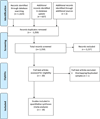Efficacy of group social skills interventions for youth with autism spectrum disorder: A systematic review and meta-analysis
- PMID: 28130983
- PMCID: PMC5358101
- DOI: 10.1016/j.cpr.2017.01.006
Efficacy of group social skills interventions for youth with autism spectrum disorder: A systematic review and meta-analysis
Abstract
Group-based social skills interventions (GSSIs) are widely used for treating social competence among youth with autism spectrum disorder (ASD), but their efficacy is unclear. Previous meta-analysis of the literature on well-designed trials of GSSIs is limited in size and scope, collapsing across highly heterogeneous sources (parents; youths; teachers; observers; behavioral tasks). The current meta-analysis of randomized control trials (RCTs) was conducted to ascertain overall effectiveness of GSSIs and differences by reporting sources. Nineteen RCTs met inclusion criteria. Results show that overall positive aggregate effects were medium (g=0.51, p<0.001). Effects were large for self-report (g=0.92, p<0.001), medium for task-based measures (g=0.58, p<0.001), small for parent- and observer-report (g=0.47 and 0.40, respectively, p<0.001), and nonsignificant for teacher-report (p=0.11). Moderation analyses of self-report revealed the effect was wholly attributable to youth reporting that they learned about skilled social behaviors (social knowledge; g=1.15, p<0.01), but not that they enacted them (social performance; g=0.28, p=0.31). Social skills interventions presently appear modestly effective for youth with ASD, but may not generalize to school settings or self-reported social behavior.
Keywords: Autism spectrum disorder; Intervention; Meta-analysis; Social skills.
Copyright © 2017 Elsevier Ltd. All rights reserved.
Conflict of interest statement
The authors declare no financial or personal conflicts of interest.
Figures





References
-
- Andrews L, Attwood T, Sofronoff K. Increasing the appropriate demonstration of affectionate behavior, in children with Asperger syndrome, high functioning autism, and PDD-NOS: A randomized controlled trial. Research in Autism Spectrum Disorders. 2013;7(12):1568–1578. http://doi.org/10.1016/j.rasd.2013.09.010. - DOI
-
- Begeer S, Gevers C, Clifford P, Verhoeve M, Kat K, Hoddenbach E, Boer F. Theory of mind training in children with autism: A randomized controlled trial. Journal of Autism and Developmental Disorders. 2011;41(8):997–1006. http://doi.org/10.1007/s10803-010-1121-9. - DOI - PMC - PubMed
-
- Begeer S, Howlin P, Hoddenbach E, Clauser C, Lindauer R, Clifford P, Koot HM. Effects and Moderators of a Short Theory of Mind Intervention for Children with Autism Spectrum Disorder: A Randomized Controlled Trial. Autism Research. 2015 Apr;:738–748. http://doi.org/10.1002/aur.1489. - DOI - PubMed
-
- Corbett BA, Key AP, Qualls L, Fecteau S, Newsom C, Coke C, Yoder P. Improvement in Social Competence Usinga Randomized Trialof a Theatre Intervention for Children with Autism Spectrum Disorder. Journal of Autism and Developmental Disorders. 2016;46(2):658–672. http://doi.org/10.1007/s10803-015-2600-9. - DOI - PMC - PubMed
-
- Frankel F, Myatt R, Sugar C, Whitham C, Gorospe CM, Laugeson E. A randomized controlled study of parent-assisted children’s friendship training with children having autism spectrum disorders. Journal of Autism and Developmental Disorders. 2010;40(7):827–842. http://doi.org/10.1007/s10803-009-0932-z. - DOI - PMC - PubMed
Publication types
MeSH terms
Grants and funding
LinkOut - more resources
Full Text Sources
Other Literature Sources
Medical
Miscellaneous

